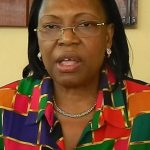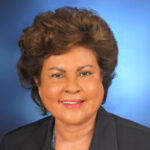Our history
FAWE was founded in 1992 by five African women ministers of education who believed that women in decision-making positions have the potential to make a significant difference. Registered in Kenya as a pan-African Non-Governmental Organisation in 1993, we today operate through 34 National Chapters We have now grown to become an integral part of the education movement across sub Saharan Africa and an authority on girls’ schooling in the region, earning respect and recognition at international, regional and national levels. Our various international awards recognize our influential role in the campaign for gender equity in education.
FAWE was founded in 1992 by five African women ministers of education — the late Hon. Vida Yeboa of Ghana, Hon. Simone de Comarmond of Seychelles, Hon. Paulette Missambo of Gabon, Hon. Dr Fay Chung of Zimbabwe, and Hon. Alice Tiendrebéogo of Burkina Faso.
FAWE was born out of discussions between African ministers and donor agency representatives of the Donors to African Education (DAE). It was created on the staunch belief that women in decision-making positions have the potential to make a significant difference.
The creation of FAWE was formalized by a meeting held in September 1992 at the Rockefeller Foundation’s Bellagio Centre in Italy.
In her opening remarks, Hon. Dr Chung said, “We are here to search for practical, manageable interventions that will realistically help to ameliorate the present situation. We are not helpless as a group. We need to have a vision of where we want to go, realizing that each day, there is something positive we can do”.
The Bellagio meeting brought together nineteen senior African women policy-makers in education drawn together by a common concern — the poor status of female education in Africa.
In order for these ministers, vice-chancellors and prominent educationalists to make the difference they desired to make, a mechanism had to be put into place that would enable them to share views, exchange experiences, explore alternatives and pool their intellectual resources constantly. The formation of a network that would support members and their institutions, strengthening their capacity for influencing policy-making and policy-shaping, was clearly a priority.
FAWE was registered as a pan-African Non-Governmental Organisation in Nairobi, Kenya, in 1993.
In October 1991, five African women ministers of education met informally during a World Bank meeting of donors to African education to discuss the very real obstacles faced by African girls and women in gaining an education and improving the quality of their lives.
Recognizing that there was much that they and other decision-makers could do to collectively address these problems, they put forward the idea of creating a network of prominent women in African education who could come together to propose measures and advocate for transformation of the African education landscape for greater gender equality.
They met again in September 1992 and, with a group numbering 19 senior African women policy-makers in education, launched the Forum for African Women Educationalists.
These women were Hon. Simone de Comarmond of Seychelles, Hon. Dr Fay Chung of Zimbabwe, Hon. Paulette Missambo of Gabon, Hon. Alice Tiendrebéogo of Burkina Faso and the late Hon. Vida Yeboa of Ghana.
In our early years, our efforts were focused on advocacy to place girls’ education on the policy agenda at national and international levels. Our focus thereafter went beyond advocacy and moved towards influencing action on the ground to reduce gender disparities in access, retention and performance.
Today, FAWE sits on various global education forums, including the United Nations Girls’ Education Initiative (UNGEI), Global Advisory Committee and the Global Campaign for Education.
FAWE operates through 34 National Chapters from which it addresses female education as it relates to long-term economic development and its centrality and urgency in education sector planning.
Our organisation has influenced governments to review and reform policies that hinder girls’ access to education. Countries in which we operate have adopted gender-responsive policies and subsequently experienced improved enrolment, retention and performance of girls in school.
FAWE has thus grown to become an integral part of the education movement in sub-Saharan Africa, and an authority on girls’ schooling in the region, earning respect and recognition at international, regional and national levels.
We have received international awards that recognize our influential role in the campaign for gender equity in education: the UNESCO Comenius Medal in 1999, the Hendry R. Kravis Prize in Leadership in 2008 and the President of the Republic of Burkina Faso prestigious Chevalier de l’Ordre National (Knight of the National Order) in 2012.





